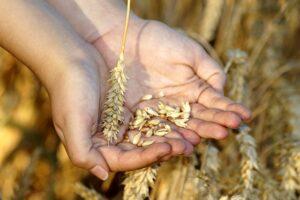Fifty-two winter wheat varieties and 15 rapeseed hybrids were examined in the objective national test of the GOSZ-VSZT NAK
The first step in establishing a successful farming season is choosing the right variety. In this, the National Association of Cereal Growers (GOSZ), the Inter-Trade Association and Product Council of the Seed Association (VSZT), and the National Chamber of Agriculture (NAK) provide useful and objective help to farmers in the national winter wheat and winter cabbage rape post-registration variety trials, the latest results of which are summarized in publications were published by the organizers for all interested parties.

(Photo: Pixabay)
Among the field crops that are sown in autumn with a longer maturity period, the most significant in Hungary are winter wheat grown on nearly 900,000 hectares, as well as autumn cabbage-rape with a sowing area of 174,000 hectares. The post-registration experiments of the National Association of Grain Growers, the Interprofessional Organization and Product Council of the Seed Association, and the National Chamber of Agriculture have been providing farmers with objective information about varieties for a long time. “The first step in farming is the selection of the right metal-sealed seed, our variety experiments in this area provide important information about the performance of each variety. Among them, newly registered varieties appear every year. The work of breeders looking ahead for decades is extremely important from the point of view of the competitiveness of domestic agriculture, since the varieties they breed have to cope with challenges such as climate change and the increase in weather extremes”, emphasized Géza Takács, President of the Seed Association Inter-Trade Organization and Product Council.
According to Tibor Zászlós, the vice-president responsible for agriculture of the National Chamber of Agrarian Economy (NAK), the results of the variety trials have always given farmers an important clue, and this is even more true in this year of extreme weather. The tests gave an answer to which varieties and hybrids can perform better under extraordinary conditions. According to Tamás Petőházi, the president of the National Association of Grain Growers (GOSZ), the publication of the results is noticeably more closely watched every year. The decrease in profitability in recent years makes the choice of variety even more important. The use of the results of the experimental system can be the basis of the profitability of the following cultivation year.
A total of 52 varieties included in the 17th GOSZ-VSZT winter wheat variety experiment were sown in the fall in 8 locations of the country with different cultivation characteristics – in Bóly, Füzesabony, Hajdúböszörmény, Martonvásár, Mosonmagyaróvár, Szarvas, Szeged, and Szombathely. This year, the varieties of the experimental series were divided into early and medium ripening groups, and all varieties were planted with the same seed rate. The variety owners involved in the implementation of the experiment received the varieties of the plots coded, thus ensuring impartial treatment and communication of results. Visitors could see the Mosonmagyaróvár breed range in the framework of a presentation organized by István Széchenyi University. The supervision of the experiments and the tasks related to the implementation were carried out by the Variety Experiment Innovation Council (FIT).
When evaluating the experiment, the yield results of the 8 locations, other agronomic characteristics of the varieties, and the grain yield quality test data were used
The content parameters of the varieties were examined using the rapid test equipment of the National Chamber of Agrarian Economy. The National Chamber of Agrarian Economy regards the range of varieties included in the experiment as a list of offer varieties, emphasizing that there are many excellent varieties available to producers in addition to those participating in the experiment.
Among the variety trials of GOSZ-VSZT, autumn cabbage rape trials have been ongoing since 2019
In the 2024 experiment, 8 variety owners started a total of 15 hybrids, of which 11 hybrids were in the mid-ripening group and 4 hybrids in the early-ripening group. The locations of the experiments were Bóly, Bödönhely, Püski, Sopronhorpács, Taktaharkány and Vámosszabadi. After the 2023/24 fall cabbage-rape sowing period, the Taktaharkány experiment had to be excluded due to the severe lack of rainfall, vole damage and the extremely uneven, poorly developed plant stock. Wintering in the other experiments was problem-free. In the first four months of the year, similar to the national situation, the areas were hit by a severe lack of rainfall, which had a strong impact on crop results. The harvests took place on time and without disturbance. During the evaluation of the results, the oil content of the varieties was examined with the help of the rapid test equipment of the National Chamber of Agrarian Economy.
vszt.hu
Related news
State compensation for the victims of Bászna Gabona Zrt. has been completed
🎧 Hallgasd a cikket: Lejátszás Szünet Folytatás Leállítás Nyelv: Auto…
Read more >In 2025, FruitVeB considered the support and professional coordination of the TÉSZs as its priority task
🎧 Hallgasd a cikket: Lejátszás Szünet Folytatás Leállítás Nyelv: Auto…
Read more >Related news
How does the forint exchange rate affect consumer prices?
🎧 Hallgasd a cikket: Lejátszás Szünet Folytatás Leállítás Nyelv: Auto…
Read more >Two million people have already voted, so 57 million forints will be given to locals in 125 settlements, courtesy of Tesco
🎧 Hallgasd a cikket: Lejátszás Szünet Folytatás Leállítás Nyelv: Auto…
Read more >








